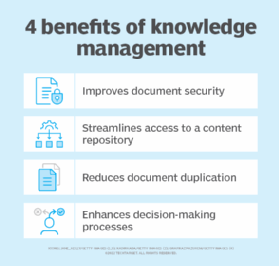
Getty Images/iStockphoto
What are the top benefits of knowledge management?
A proper knowledge management strategy can help organizations boost document security, increase employee efficiency and decrease frustration in searches for digital assets.
In a highly competitive landscape where organizations aim to retain talent and enable more employee efficiency, knowledge management plays a key role.
Knowledge management can help organizations deliver, store and retrieve corporate information and digital assets that employees need to access in a knowledge base. These assets include customer contracts, processes, procedures, marketing collateral, pricing, reporting and other important data.
Many employees use a knowledge base daily to retrieve information related to customers, processes, solutions to issues and other key areas. But knowledge, if not appropriately managed, can lead to inefficiencies and frustration from employees. An effective knowledge management strategy can offer several benefits to organizations.
Explore the top benefits of proper knowledge management for employees.
1. Standardized security across content
Different files may require different sets of restrictions based on their content. For example, documents with personally identifiable information about employees or clients would require more security or encryption than less critical files.
A knowledge management system can help organizations create a data governance plan that defines different access policies to content in the platform.
2. Centralized access to information
When employees need to access corporate data, a centralized content or knowledge management system can streamline this access. These systems enable employees to use one interface to locate data they need.
A knowledge management system can also help employees search more efficiently in one place instead of having to search through multiple locations, such as intranet sites, network shares, cloud storage and other file locations.

3. Decreased duplication and content sprawl
Users commonly create or save the same file in multiple locations. This situation most commonly occurs as teams collaborate on the same document. It unnecessarily duplicates content and can increase complexity when someone tries to locate the correct version of the file.
A knowledge management system can help manage document lifecycles and, with the appropriate structure, can ensure users don't accidently duplicate files.
4. Improved decision-making
Whether a customer support agent looks to address a customer's need or a sales representative searches for marketing materials, a knowledge management platform can help them gain access to assets quickly, improve their decision-making processes and boost customer satisfaction.
Organizations can see value in supporting employees' need for quick and easy access to digital assets. A knowledge management platform can support more efficient work and enhance user experiences when interacting with data.







